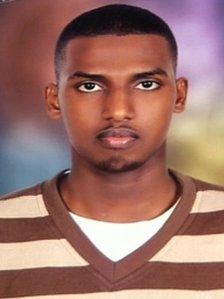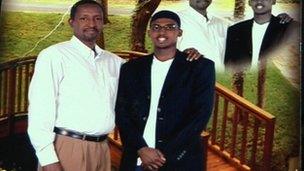Mahdi Hashi has British citizenship revoked for 'extremism'
- Published

Mahdi Hashi, from Camden, is thought to be in jail in East Africa
A man from north London accused of being an Islamic extremist has had his British citizenship revoked.
Family and friends of Mahdi Hashi, 23, from Camden, claim the government acted because he had refused to become an informant for the security services.
Mr Hashi, from Camden, is currently thought to be in a jail in East Africa.
Revoking his nationality in the summer, the Home Office said he was considered a threat to UK national security due to his "extremist" activities.
The government has since made no further comment.
Mr Hashi was born in Somalia and moved to London with his family at the age of five.
In 2009, Mr Hashi claimed he and a group of friends - all of Somali origin - were approached by MI5.
'Posing as postmen'
One of them, Mohamed Nur, said: "One day they (MI5 officers) came to my house pretending to be postmen. When I let them in they accused me of being an extremist.
"They said the only way to remove that taint from my name is if you work for us, otherwise wherever you go we can't protect you... We perceived it as blackmail."
Another friend, Abshir Ahmed, said: "I felt bullied. I don't want to work with MI5 so they should just leave me alone."

Mohamed Hashi said the family is worried for his son's safety and wellbeing
None of the men were charged with an offence and Mr Hashi's friends and family reject accusations he was an extremist.
They claim MI5 bombarded him with phone calls, prompting him to move to his parents' homeland of Somalia.
Mr Hashi and his family have been supported by human rights group Cageprisoners.
A spokesman said the "harassment made Mahdi's life miserable". He added: "He felt he had no option but to leave the UK and move to Somalia."
Mr Hashi's family say he got married there but earlier this summer the family received a letter from the Home Office telling them his citizenship was being revoked as he was considered "a threat to the national security of the United Kingdom" due to his "extremist" activities.
The letter stated the decision was made in part on the basis of secret evidence which "should not be made public in the interest of national security".
The family say Mr Hashi then disappeared and the next they heard of him was news from a man who had been released from a prison in Djibouti, East Africa.
He told them Mr Hashi was held alongside him before being taken away by American forces.
The US runs a large counter-terrorism base, Camp Lemmonier, in Djibouti and his family believe he may have been taken there.
His mother Kaltum said: "I don't even know if my son is alive or dead, I just want the government to help him."
His father Mohamed said: "We are worrying a lot about his whereabouts, his health and his safety... I would like him to be judged in a trial before his citizenship is just taken away."